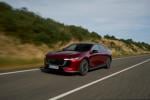The Government wants at least 50% — and as many as 70% — of new car registrations to be ultra-low emission by 2030, alongside up to 40% of new vans.
Since 2009, the Office for Low Emission Vehicles (OLEV) has considered an ultra-low emission vehicle (ULEV) to be a car or van that emits less than 75g/km of CO2.
Recognising advancements in technology, the Government says that from 2021 it expects to define an ULEV as a car or van that emits less than 50g/km.
The Road to Zero Strategy is technology neutral and does not speculate on which technologies might help to deliver the Government’s 2040 mission.
The Government has no plan to ban any particular technology - like hybrids - as part of this strategy.
The ULEV target is one of series of measures, outlined in the Road to Zero strategy, which has been published today, Monday, July 9.
There is also a proposal for increasing the grant level of the Workplace Charging Scheme from £300 per socket to 75% of the purchase and installation costs of a chargepoint capped at a maximum of £500 per socket.
The Government says it will take steps to enable a “massive roll-out of infrastructure” to support electric vehicle (EV) adoption.
Together, the measures will put the UK at the forefront of a global revolution in motoring and help to deliver cleaner air, a better environment and a strong clean economy, it said.
As set out in the government’s Air quality plan, the UK will end the sale of new conventional petrol and diesel cars and vans by 2040.
The Road to Zero Strategy will build on this commitment and outlines how Government will work with industry to support achieving this.
Chris Grayling, secretary of state for transport, said: “The coming decades are going to be transformative for our motor industry, our national infrastructure and the way we travel.
“We expect to see more change in the transport sector over the next 10 years than we have in the previous century.
“We are expecting our economy and society to experience profound change, which is why we have marked the Future of mobility as one of the four grand challenges as part of our modern Industrial Strategy.
“The Road to Zero Strategy sets out a clear path for Britain to be a world leader in the zero emission revolution - ensuring that the UK has cleaner air, a better environment and a stronger economy.”
The Government‘s mission, as part of the modern Industrial Strategy, is to put the UK at the forefront of an industry that is estimated to be worth up to £7.6 trillion per year by 2050.
David Martell, chief executive of Chargemaster, said: “We welcome the Government’s continued support for electric vehicles, which are already enabling zero-emission motoring for over 150,000 drivers in the UK.
“We are very pleased to see the continued focus on supporting home charging, as well as an increase in the Workplace Charging Scheme, and a commitment to encourage the installation of charging infrastructure in new developments, which will cost less than retrofitting it in the future.”
RAC head of roads policy Nicholas Lyes said: "Motorists' concerns about the limited range offered by electric vehicles needs to be addressed head on - manufacturers have a role to play here, but so too does the Government in ensuring the necessary rapid charge infrastructure exists.
"The incentives offered to drivers to buy a new, cleaner vehicle also needs to be looked at. Changes to the car tax system last year arguably made it less attractive to buy a plug-in hybrid vehicle - which is odd, given the government's recognition that these vehicles are a crucial stepping stone to an all-electric vehicle.
"There is a strong argument for looking at new incentives to help make the purchase price as comparable to similar sized conventional equivalents - perhaps by way of a VAT discount or even an exemption on them.
"New charging technologies also have a big role to play - and it is pleasing to see the government has seen the role that street lights can play in offering charging infrastructure."
BVRLA chief executive Gerry Keaney added: “The increased grant available through the Workplace Charging Scheme will encourage more companies to install charge points, however, we are still concerned about the cost and complications that fleet operators wanting to install EV infrastructure face when trying to arrange planning permission or deal with local distribution network operators.
“It is critical that the right incentives are in place to support this strategy. Fleets invest billions of pounds on new cars, vans and trucks each year and a significant portion of this purchasing power stands ready to bring thousands more plug-in electric vehicles on to the UK’s roads. This can only happen if they are given the right supporting environment to deliver a managed transition away from petrol and diesel engines.
“As the recent Joint Select Committee on Air Quality recommended, there needs to be a greater alignment between the tax regime and efforts to improve air quality. The tax system is crucial to incentivising the right vehicle choice.
"We would urge the government to provide clarity at the upcoming Budget as to how this can be achieved. As a start we are calling on the Chancellor to accelerate the introduction of the 2% Company Car Tax band for zero-emission vehicles. This tax band is currently scheduled to increase over the next two years to a high of 16% in 2019/20, before dropping to 2% the year after.
“We know from our latest sustainability study that those taking cash allowances emit an average of 145g/km of CO2 compared to lease car drivers who emit an average of 114g/km CO2. Company cars are cleaner, and government can have a quick win by creating a tax system that incentivises the uptake of company cars, rather than driving people towards cash allowances.”
“Looking further forward, we are desperately in need of a zero-emission taxation roadmap that will give fleet operators the confidence to make long-term investments. We are starting to work with our members and other stakeholders to develop this roadmap.”
However, while welcoming the strategy, Erik Fairbairn, CEO and Founder of Pod Point, said that it was “disappointing in that there is no movement on the Government’s 2040 ban of internal combustion vehicles.
“At Pod Point we see a clear path which would allow internal combustion vehicles to be banned in 2030, some ten years earlier.”
Road to Zero Strategy measures include:
- A push for chargepoints to be installed in newly built homes, where appropriate, and new lampposts to include charging points, potentially providing a massive expansion of the plug-in network.
- The launch of a £400 million Charging Infrastructure Investment Fund to help accelerate the roll-out of charging infrastructure by providing funding to new and existing companies that produce and install charge points. The request for proposal to appoint a fund manager will be launched in the summer.
- Creating a new £40 million programme to develop and trial innovative, low cost wireless and on-street charging technology.
- Providing up to £500 for electric vehicle owners to put in a charge point in their home through the Electric Vehicle Homecharge Scheme. And an increase in the value of to install chargepoints] so people can charge when they are at work.
- The extension of the Plug-In Car and Van Grants to at least October 2018 at current rates, and in some form until at least 2020, allowing consumers to continue to make significant savings when purchasing a new electric vehicle.
- The launch of an Electric Vehicle Energy Taskforce to bring together the energy and automotive industries to plan for the increase in demand on energy infrastructure that will result from a rise in the use of electric vehicles.
For more on this story, see the July 26th edition of Fleet News.





















Login to comment
Comments
No comments have been made yet.